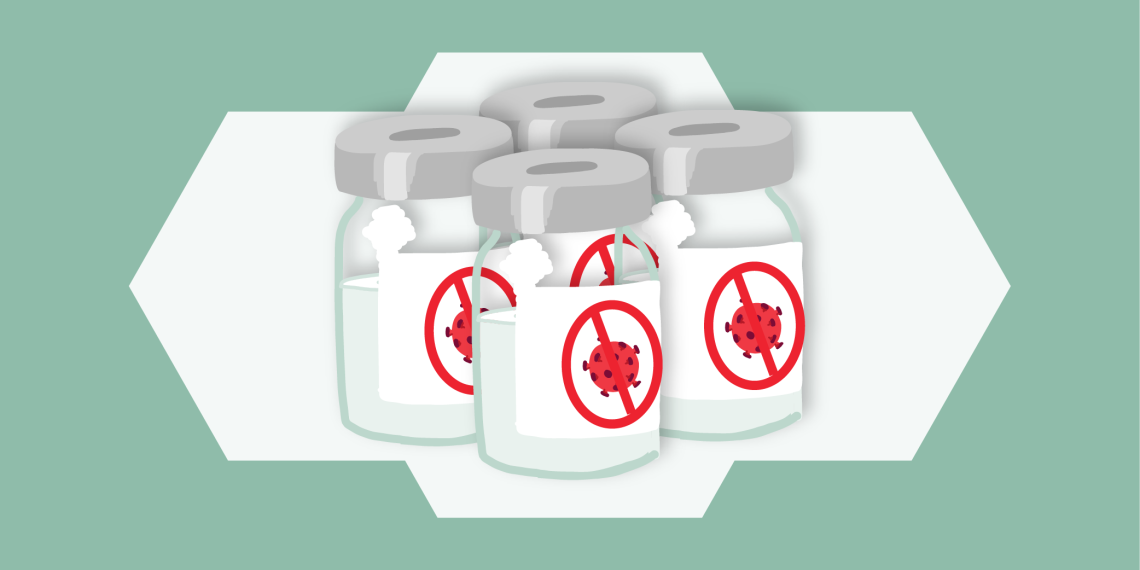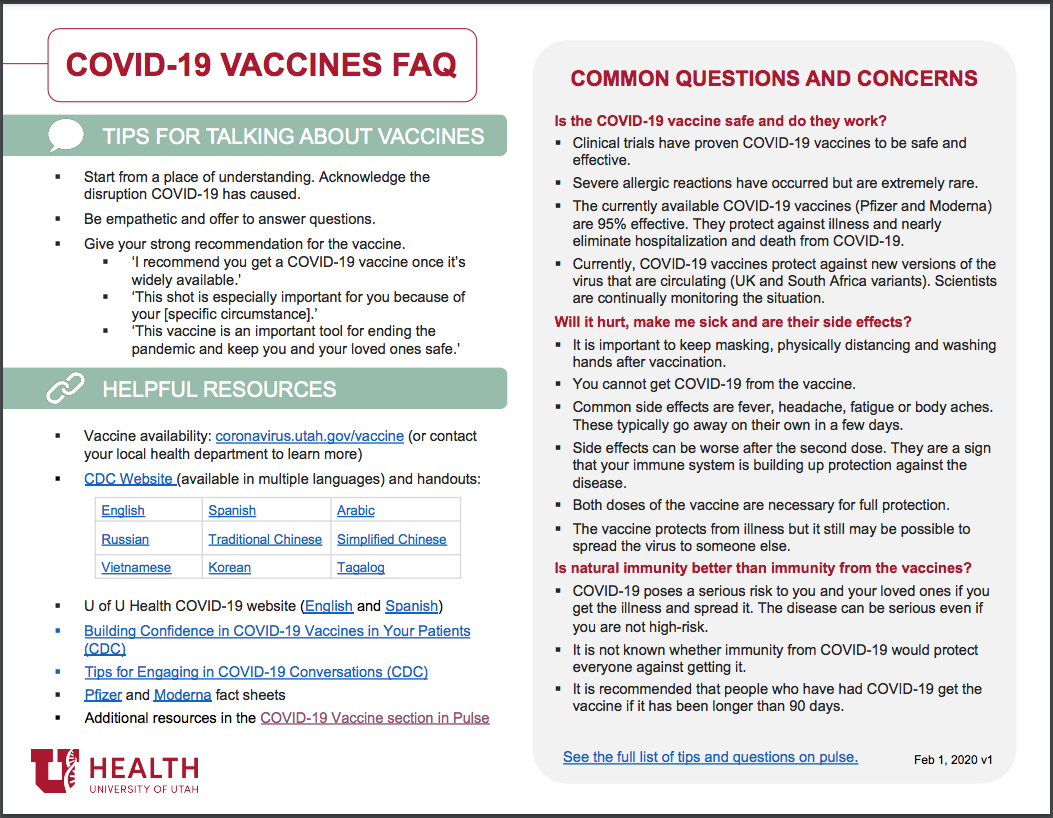n a long year, vaccine distribution has become the newest obstacle for patients and practitioners alike. Every day we’re fielding calls and emails from excited patients asking us how and when they can get their shots.
We know that patients trust their providers for guidance even more heavily than guidance from the government. Especially for Black patients and those from marginalized communities often subject to misinformation, advice from a provider they know is even more important. We’re ready to have individual conversations with patients about their medical history and contraindications; that’s what we do every day. But being ready to share the logistics of how to get your vaccine has been challenging.
Here are some of the ways we’ve been talking with individual patients and preparing our teams to help answer questions:
#1: Choose to get vaccinated yourself and talk about it
Alison: I share my experiences with my patients. I recently had my second vaccine, and I’m really happy with how it went. Patients trust that I’m going to tell them to get the vaccine and explain why. I tell them why I decided to get the vaccine, even though I’m younger than my patients. I share what I’ve heard about the process at the health department.
Bernadette: I try to validate people’s fear, especially if they’ve had any reactions to vaccination before. It’s ok to be scared. I was excited to get my own vaccine, but I also had moments where I worried. I understand patients’ concern. I use the principles that work in any human interaction—empathizing, listening, and giving accurate information if that is what they need. I tell them about my experience. "Yes, I had my vaccine, and I’ve been feeling great, no reaction."
When people ask me if the vaccine is safe, I tell them there are very few contraindications to the vaccine. I talk to them about their own individual medical complexity. We review their problem list, and I say "Looking at your history, you are actually more at risk of getting seriously ill from Covid-19. The risk-benefit ratio favors you getting the vaccine." I tell them about our processes in place to manage allergies and reactions, and that if they need medical help that we’re here.
#2: Start conversations early
Alison: I counsel everyone I talk to. Every appointment that I have, even if they don’t bring up the vaccine, I ask “Are you going to get it? How are you going to get it? Are you aware that you have to go to the health department website?” I have yet to encounter anybody who is not agreeing to be vaccinated. Most of the questions I get now are about when is it their turn.
By starting conversations early, we can empower patients to be more proactive in learning about the vaccine. We can also show them that they don’t have to navigate the process alone—we’re here to help.
How to prepare for the Covid-19 vaccine conversation
Click here to access tips from the CDC through Pulse.
-
Choose to get vaccinated yourself
-
Start Conversations early
-
Engage in effective conversations
-
Be prepared for questions
#3: Engage in effective conversations
Alison: I address people’s fear about Covid-19. One of the things that I'll say to people, if they are at all hesitant, is "The potential risks of this vaccine are so much less than your personal risk of getting Covid-19." The hardships of this disease have fallen most on our older patients. The fear, the frustration, and the isolation have just been devastating for some of our patients. Once a day, I hear, "I just want somebody to give me a hug." This vaccine offers relief from the terrifying consequences of Covid-19. For those patients who are very med sensitive and have a long list of allergies, I listen and sometimes provide a gentle nudge. I have one patient that I think of in particular who is absolutely terrified of potential side effects of medicines and vaccines. My gentle nudge to her is that the risk of infection is so much greater than any risk with the vaccine.
Bernadette: When people ask me if the vaccine is safe, I tell them there are very few contraindications to the vaccine. I talk to them about their own individual medical complexity. I talk to them about their problem list, and I say "Looking at your history, you are actually more at risk of getting seriously ill from Covid-19. The risk-benefit ratio favors you getting the vaccine." I tell them about our processes in place to manage allergies and reactions, and that if they need medical help that we’re here.
The CDC recommends these strategies for effective conversations.
-
Be empathetic and understanding. Engage in active listening and respond to all of the patient’s questions and concerns. For instance, some of our patients were concerned about severe reactions. We reassured them by explaining that a medical team would monitor them after they received their shot.
-
Assume patients want to be vaccinated, but be prepared for their questions and concerns.
-
Offer your strong recommendation. Some patients believe the vaccine is an unnecessary risk. It’s important to remind them that they are much more likely to get seriously ill from Covid-19, and that the benefits of the vaccine outweigh short-term discomfort.
-
Address misinformation. Patients are struggling to separate fact from fiction. Identifying common myths, correcting any inaccuracies, and sharing key facts can help clear up the confusion.
- Be proactive. Help patients prepare for their shot by discussing the common side effects they might experience.
#4: Be prepared for questions
As soon as it was clear the vaccines were going to be approved, we started fielding questions non-stop. We knew we had to help them answer the questions easily. We both use Smart/dot phrasesSmart phrases are shortcuts, also known as auto text, dot phrases, etc., in Electronic Health Records (EHRs). to help make it easy on our team and the call center. Back in December, we created our own and kept it updated with information from the health department. Alison always starts the message with “I’m glad you’re thinking about getting the vaccine…” You can find county-specific dot phrases here.
Overall, our patients are looking for reassurance. We can empower them to make the right choice by offering guidance, information, and support tailored to their specific needs.
Although we’re not the ones administering the vaccine to our patients, we’re an important part of the process. As trusted educators and advisors, we are responsible for helping our patients regain their faith in the health care system. These four steps will help us improve communication and reestablish confidence in the vaccine.
Resources
- COVID-19 Vaccine Information— U of U Health faculty, staff and trainees can learn more on Pulse.
- Building Confidence in COVID-19 Vaccines Among Your Patients: Tips for the Healthcare Team (Dec 2020)— 39 slides that share tips for addressing vaccine confidence in patients and health care professionals.
- CDC Clinical Resources for Each COVID-19 Vaccine— Find information for COVID-19 vaccination administration, storage and handing, reporting, and patient education for each specific vaccine.
Alison Schlisman
Bernadette Kiraly
Rural and frontier communities have a harder time accessing care due to long distances and a shortage of medical resources in their own communities. The leaders of the Rural & Underserved Utah Training Experience (RUUTE) program, Kylie Christensen (medical school) and Sri Koduri (residency programs/GME), share what they’ve learned about improving access for rural communities now and into the future.
Microaggressions commonly occur in medical settings creating psychologically unsafe environments of learning, working, and healing. Pediatricians Reena Tam and Margie Diaz-Ochu share how clinician-educators can cultivate awareness and practical tools to create safer, braver spaces in the moment.
To disagree means failing to agree. Synonyms include to contradict, challenge or debate. Synonyms do not also have to include to argue, quarrel, dispute, bicker or clash. Pediatric intensivist Jared Henricksen shares the best path forward when words become clouded with emotion.

